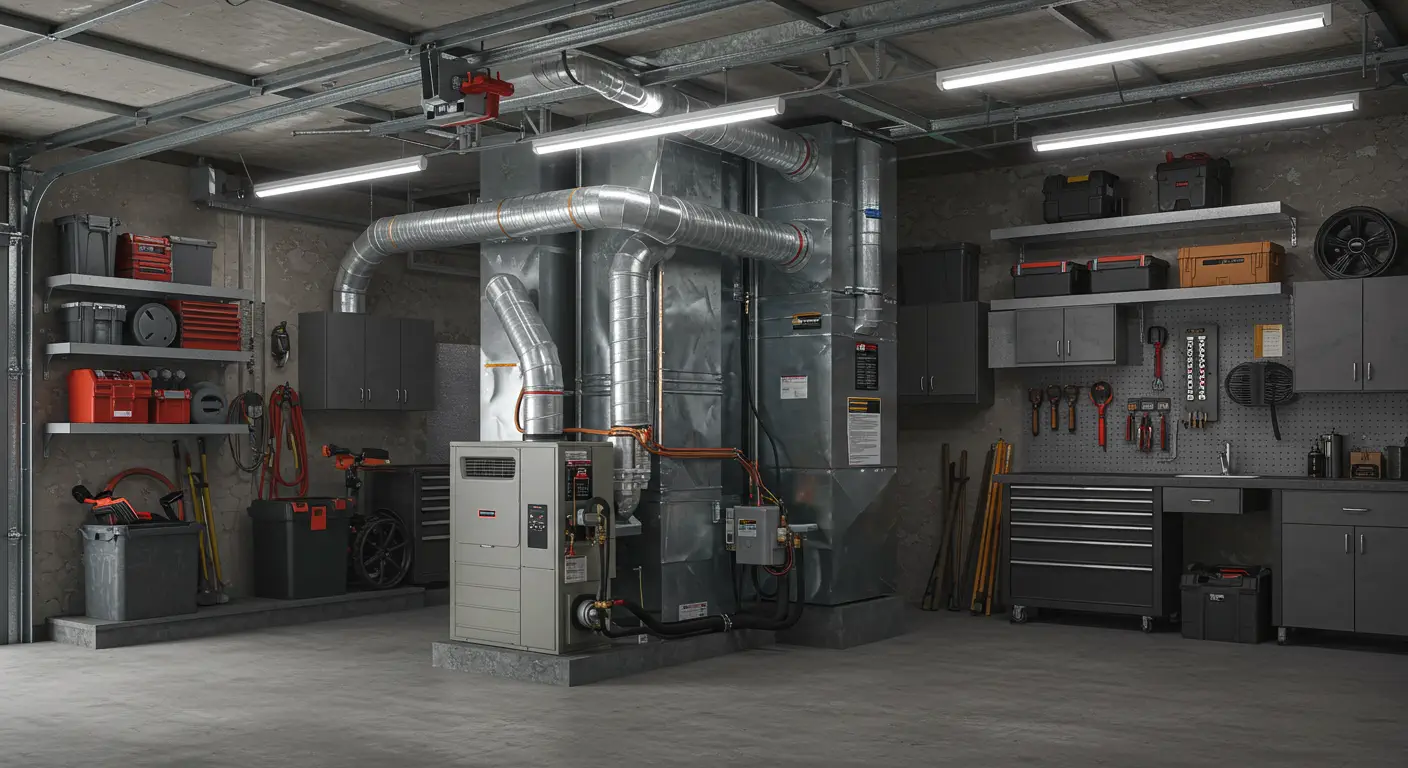Garage Heating & Air Conditioning in Cornelia, GA
Professional garage HVAC in Cornelia, GA by Res Air LLC. Stay comfortable all year with expert installation. Contact us to book your heating & air service!
Garage Heating & Air Conditioning in Cornelia, GA
Keeping your garage comfortable and safe matters year-round in Cornelia, GA. With hot, humid summers and cool winter nights in Northeast Georgia, garages that serve as workshops, storage for classic cars, or converted living space need properly sized heating and cooling, reliable ventilation, and installation practices that protect tools, vehicles, and stored items from moisture and temperature extremes. This page from Res Air LLC explains options, common issues in Cornelia homes, assessment and installation best practices, safety concerns, and maintenance approaches to keep a garage HVAC system running reliably.
Why Garage HVAC Matters in Cornelia, GA
Cornelia’s humid subtropical climate creates two common problems for garages: excessive heat and humidity in summer that accelerates corrosion, mildew, and discomfort, and occasional cold snaps that can damage sensitive equipment or cause pipes to freeze. Garages are often less insulated and more air-leaky than living spaces, so a standard home HVAC system rarely controls them effectively. A purpose-built garage heating and air conditioning solution from Res Air LLC preserves stored items, improves usability for hobbyists and tradespeople, and reduces moisture-related issues common in North Georgia.

Common Garage HVAC Needs and Problems in Cornelia
- Poor Temperature Control: During summer heat waves or winter cold fronts
- High Humidity Issues: Condensation on metal surfaces, mold or mildew growth
- Uneven Comfort: When the garage is used as a workshop or home gym
- Inadequate Ventilation: For vehicle exhaust, paint fumes, or woodworking dust
- Excess Energy Use: When an oversized or poorly installed system runs inefficiently
- Safety Risks: From combustion heaters without proper combustion air or ventilation
Garage HVAC Options And When To Choose Each
- Ductless Mini-Split Systems: Best for detached or unconditioned garages and situations where minimal disruption is desired. Provide efficient heating and cooling, dehumidification, and zoned controls.
- Packaged Through-The-Wall Or Packaged Unit Systems: Good for standard garages where an integrated wall-mounted unit can be installed without external ductwork.
- Heat Pumps And Multi-Zone Split Systems: Efficient year-round heating and cooling; heat pumps perform well when the garage is moderately insulated.
- Electric Resistance And Infrared Heaters: Useful for spot heating in well-insulated garages and intermittent use; they require proper electrical supply.
- Gas-Fired Unit Heaters And Direct-Fired Heaters: Offer high output for large or poorly insulated spaces; must meet ventilation and combustion air codes and include carbon monoxide mitigation strategies.
- Hybrid Approaches: Combine a mini-split for comfort control with auxiliary heaters for extreme cold or rapid warm-up.
Assessment And Sizing Considerations
Proper sizing prevents short-cycling, poor humidity control, and excessive energy cost. Key factors for sizing a garage HVAC system include:
- Square Footage And Ceiling Height
- Insulation Levels: In walls, ceiling, and garage door (R-values)
- Usage Patterns: Frequency of door openings and typical usage (workshop, storage, living space)
- Heat Gains: From solar exposure and equipment/tools
- Local Climate Variables: High summer humidity in Cornelia demands a system that can handle latent load
Professional assessments by Res Air LLC calculate heating and cooling loads rather than relying on rule-of-thumb BTU-per-square-foot estimates to match real-world garage conditions.
Recommended Installation Practices
- Place indoor units to optimize airflow across the usable workspace and away from obstructions like vehicle doors or shelving.
- Ensure outdoor condensers have proper clearance and are elevated where needed to avoid debris and standing water.
- Route refrigerant lines and condensate drains with sloping runs and insulated line sets to prevent heat gain and condensation.
- Seal and insulate the garage envelope—weather-stripped doors, insulated garage door panels, and sealed wall penetrations reduce system size and operating cost.
- Provide dedicated electrical circuits sized to code for the chosen equipment and include surge protection where appropriate.
- For fuel-fired heaters, follow combustion air, venting, and clearance requirements and install carbon monoxide detection in adjacent living areas.
Thermostat Zoning And Controls
Use separate thermostats or smart zone controllers to manage the garage independently from the house HVAC. This avoids conditioning an unoccupied space unnecessarily. Programmable or Wi-Fi thermostats from Res Air LLC allow schedules tailored to workshop hours, improving comfort and efficiency. For multi-zone mini-split systems, individual head controls let different areas of large garages be set to different temperatures or fan speeds.
Safety And Ventilation Concerns
- Install carbon monoxide detectors in any attached garage and near doors that connect the garage to living spaces.
- Provide mechanical ventilation or exhaust when running vehicles, generators, or performing painting and woodworking to remove fumes and particulates.
- Avoid using unvented combustion heaters in attached garages. If gas-fired equipment is chosen, ensure sealed combustion or direct-vent designs and proper venting to the exterior.
- Address ignition sources and combustible storage—keep flammable liquids in approved containers and ventilated areas away from heaters.
- Consider air filtration or stand-alone air-cleaning devices if the garage is used for fine dust-producing activities.
Troubleshooting And Common Repair Solutions
- Short Cycling Or Frequent On-Off: Check for incorrect sizing, refrigerant charge issues, or oversized thermostat setbacks.
- Poor Dehumidification In Summer: System may be oversized or set to high fan speeds; evaluate refrigerant charge and airflow.
- Frozen Coils Or Poor Heating Performance: Inspect airflow, defrost cycles on heat pumps, and refrigerant levels.
- Condensate Leaks: Ensure properly pitched condensate lines and clear drain traps; check pan heaters in cold conditions.
- Electrical Tripping: Verify dedicated circuits and inspect for loose connections or failing capacitors and contactors.
Maintenance Plans To Keep Systems Reliable
- Seasonal tune-ups that include refrigerant checks, coil cleaning, blower inspection, and electrical tightening prolong equipment life.
- Change or clean filters regularly, and use filters rated for garage environments if dust and particulates are present.
- Inspect condensate drains and pans for clogs and microbial growth.
- Verify thermostat calibration and check programmable schedules for seasonal adjustments.
- For gas or combustion appliances, schedule annual safety inspections and vent testing to confirm proper operation.
- Address garage envelope maintenance: re-seal weatherstripping and check insulation integrity each season.
Benefits Of A Well-Designed Garage HVAC System In Cornelia
A correctly specified and installed garage heating and air conditioning system protects tools and vehicles from humidity and temperature damage, creates a safer workspace, and expands usable square footage for hobbies or home-based businesses. In Cornelia’s humid environment, controlling moisture is just as important as temperature for long-term preservation of stored items. Proper ventilation, zoning, and routine maintenance keep systems efficient and reduce the risk of safety issues tied to combustion appliances and vehicle exhaust.
Choosing the right approach depends on how you use the space, existing insulation and construction, and local climate considerations. A professional assessment from Res Air LLC that accounts for Cornelia’s humidity, seasonal temperature swings, and your garage’s intended use will deliver a reliable, efficient solution tailored to your needs.
Take Control of Your Garage Comfort With Res Air LLC
Your garage deserves more than being just a storage space—it should be comfortable, safe, and functional year-round. Whether you use it as a workshop, gym, hobby area, or to protect valuable vehicles, the right heating and cooling system makes all the difference. At Res Air LLC, we specialize in designing and installing customized garage HVAC solutions that fit Cornelia’s unique climate and your specific needs. Don’t settle for discomfort or risk damage to your tools and equipment—partner with our trusted team. Call Res Air LLC today and transform your garage into a space you’ll enjoy every season!


Financing
We make comfort affordable with flexible financing options through Optimus and Synchrony, giving you stress-free payment solutions for your HVAC needs.


Customer Testimonials
At Res Air, our customers’ satisfaction speaks louder than words. From fast emergency repairs to flawless system installations, homeowners trust us for reliable comfort and professional service.


.png)
.jpg)
